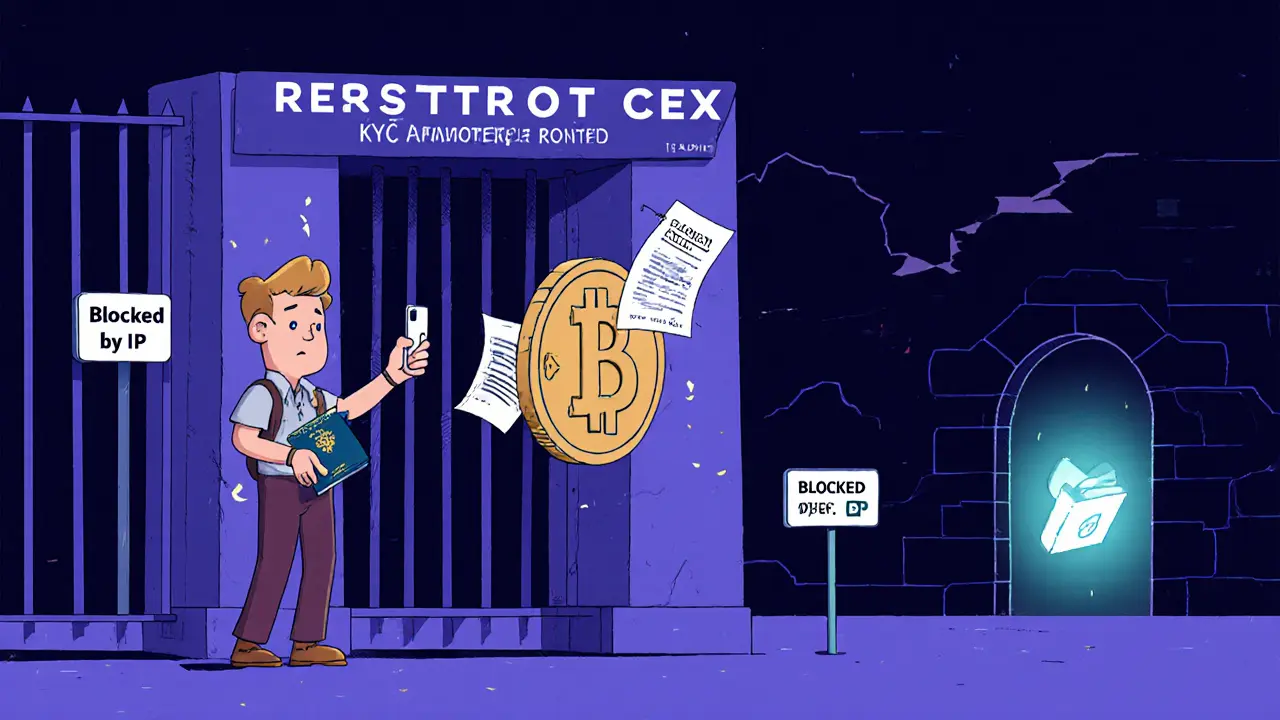Ever tried to trade crypto and got blocked just because of where you live? It’s not a glitch. It’s the system. If you’re using a CEX, your location might be the only thing stopping you from buying Bitcoin or swapping Ethereum. But if you’re on a DEX, you might still be able to trade - even if your government says no. The difference isn’t just technical. It’s legal, practical, and sometimes life-changing.
Why CEXs Block You by Country
Centralized exchanges like Binance, Coinbase, or Kraken act like banks. They need licenses. They report to governments. They collect your passport, selfie, and utility bill. That’s KYC - Know Your Customer - and it’s not optional. If you’re in a country where crypto is banned or heavily restricted, these platforms simply shut you out. No exceptions.It’s not just about being blocked outright. Some CEXs let you sign up but disable trading for certain assets. Derivatives? Gone in the EU. Stablecoin trading? Restricted in Nigeria. Margin trading? Forbidden in Canada. Even if you’re in a country where crypto is legal, you might not get access to the full platform. The rules change by region, and CEXs follow them - because if they don’t, they get fined, shut down, or lose banking access.
They don’t just rely on your ID. They track your IP address. If you’re in Russia and try to log in from a U.S. server, you’ll get locked out. Even if you use a VPN, many CEXs now detect and block them. Some even cross-check your phone number or bank details. It’s not just about location - it’s about proving you’re allowed to be there.
How DEXs Bypass Geographic Rules
Decentralized exchanges like Uniswap, PancakeSwap, or dYdX don’t care where you live. No ID. No passport. No forms. You connect your wallet - MetaMask, Phantom, or Trust Wallet - and start trading. The code runs on the blockchain. There’s no company behind it to be pressured by regulators.This isn’t magic. It’s architecture. DEXs use smart contracts. Liquidity pools. Automated Market Makers. No middleman. No one to shut down. If you have ETH or SOL in your wallet, you can trade it for anything else on a DEX - no matter if you’re in Iran, Venezuela, or China. Governments can’t block a protocol. They can only block access to websites or apps that connect to it.
But here’s the catch: you still need to get crypto in the first place. If your country bans crypto exchanges, you can’t just walk into a store and buy Bitcoin with cash. You need to get it from a peer, a P2P marketplace, or a friend overseas. Once you have it, though, you can move it to your wallet and trade on a DEX without anyone knowing.
The Fiat Problem: CEXs Win, DEXs Lose
Here’s where the game changes. CEXs let you deposit dollars, euros, or pesos directly from your bank. You click “Buy Crypto,” enter your card details, and you’re in. That’s huge for beginners. But that also means CEXs need banking partnerships - and banks hate unregulated crypto. So if your country’s banks won’t work with a CEX, that exchange can’t offer fiat on-ramps there.DEXs don’t handle fiat at all. You can’t deposit euros on Uniswap. You need crypto already. That’s a barrier. But it’s also a loophole. If you’re in a country where banks block crypto purchases, you can still get crypto through P2P platforms like LocalBitcoins or Paxful. Buy with cash, gift cards, or mobile money. Then move it to your wallet. Now you’re on a DEX - and the government has no way to stop you.
For people in hyperinflation economies like Argentina or Turkey, this isn’t a technical preference. It’s survival. DEXs let them preserve value when their local currency collapses. CEXs? They’re often blocked or too slow to help.

Regulators Are Catching Up
For years, DEXs operated in a gray zone. No license. No headquarters. No one to sue. But regulators aren’t ignoring them anymore. The EU’s MiCA law, the U.S. SEC’s crackdowns, and Singapore’s new rules are all pushing for DEXs to implement geographic controls. Some Layer 2 solutions are already testing IP blocking and wallet blacklisting. The goal? To make DEXs behave like CEXs.It’s not perfect. You can still use a VPN. You can still swap tokens through a proxy node. But the pressure is real. If a DEX gets labeled as a “money service business” in the U.S., it could be forced to comply - or face penalties. Some DEXs are already adding warnings: “Trading may be restricted in your jurisdiction.”
This isn’t the end of DEX freedom - yet. But the era of complete anonymity and total freedom is fading. The question isn’t whether DEXs will be regulated. It’s how much they’ll change before they are.
Security Trade-Offs: Control vs. Autonomy
CEXs promise safety. They hold your keys. They freeze accounts if they see fraud. They recover your password. They insure your funds. But that safety comes at a cost: control. If a CEX gets hacked, you might lose everything. If a government orders them to freeze your account, they will. You have no recourse.DEXs give you full control. Your keys. Your wallet. Your money. No one can freeze it. No one can take it. But if you lose your seed phrase? Gone forever. If you send crypto to the wrong address? No one can reverse it. If you trade something illegal in your country? You’re on your own.
It’s not just about geography. It’s about responsibility. CEXs make it easy but take away power. DEXs give you power but demand expertise. In countries with weak legal systems, DEXs are a lifeline. In countries with strong consumer protections, CEXs feel safer.

Real-World Examples: Who Gets Left Out?
In Nigeria, CEXs like Binance were forced to stop direct Naira deposits in 2021. But millions still trade on DEXs using P2P Bitcoin. In Iran, where U.S.-based exchanges are blocked, traders use DEXs to swap crypto for stablecoins and avoid inflation. In Russia, after sanctions hit, many switched from CEXs to DEXs to move value across borders without banks.Meanwhile, in the U.S., you can buy crypto easily on Coinbase - but you can’t trade derivatives or leverage. In the UK, you can trade spot crypto but not crypto futures. In Japan, you need government-approved wallets. In Thailand, you must use licensed exchanges only.
The same asset - Bitcoin - can be legal to hold but illegal to trade in certain ways, depending on where you are. And the rules change every year.
What’s Next? The Two Paths
There are two futures for crypto trading.One: CEXs become even more regulated. They’ll split into region-specific versions. You’ll need different apps for the U.S., EU, and Asia. Fees will rise. Features will be locked. But you’ll have customer support and insurance.
The other: DEXs get smarter. They’ll build in compliance tools - not because they want to, but because they have to. Wallets might be flagged. Transactions might be delayed. But the core code will stay open. The freedom will remain - just harder to use.
For now, if you’re in a restrictive country, DEXs are your best bet. If you’re in a stable economy and want simplicity, CEXs still win. But if you value control over convenience - and you’re willing to learn - DEXs give you a path no government can fully block.
Can I use a DEX if my country bans crypto?
Yes - if you already have crypto. DEXs don’t require registration or KYC. You just connect your wallet and trade. But if your country blocks access to crypto websites or P2P platforms, you’ll need a way to get crypto in the first place - like cash trades or peer transfers. Once you have it, DEXs are harder to block than centralized exchanges.
Why can’t DEXs just block users by location like CEXs do?
Technically, they can - but it goes against their design. DEXs run on public blockchains. No single entity controls them. You can’t easily block an IP address on a decentralized network without breaking the protocol. Some DEXs are now testing wallet-based restrictions or geo-fencing via oracles, but it’s not widespread. Most still operate as open systems - which is why regulators are pushing for changes.
Is it safer to use a CEX or a DEX?
It depends. CEXs offer insurance, customer support, and recovery options - but they can freeze your funds or get hacked. DEXs give you full control, but if you lose your private key, your money is gone forever. There’s no customer service. No chargebacks. No refunds. For beginners, CEXs are safer. For experienced users who understand self-custody, DEXs offer more freedom - and less risk of government interference.
Can I use a VPN to bypass CEX restrictions?
Sometimes - but it’s risky. Many CEXs now detect and block VPNs. Even if you get in, using a VPN to access restricted services can violate their terms of service. Your account could be frozen or closed. In some countries, using a VPN for crypto trading might even be illegal. It’s not a reliable long-term solution.
Do I need to pay taxes if I trade on a DEX?
Yes. Tax laws apply regardless of the platform. Whether you trade on Coinbase or Uniswap, you’re still responsible for reporting capital gains or losses. Governments are starting to track on-chain activity through blockchain analytics firms. Just because a DEX doesn’t report to the IRS or HMRC doesn’t mean you’re exempt from paying taxes.

Leo Lanham
November 6, 2025 AT 09:56Bro just used a DEX in Canada and got flagged by my bank. They called me. Asked if I was laundering money. I said no. They said they’re freezing my account for 30 days. So yeah, DEXs might be ‘free’ but your bank ain’t.
Brian Webb
November 6, 2025 AT 19:07I get what you're saying about DEXs being the only way out in restricted countries, but let’s not pretend it’s all sunshine. I helped my cousin in Nigeria buy BTC via P2P, then swap on Uniswap. He lost $800 because he sent it to the wrong address. No one could help him. DEXs don’t care if you mess up. That’s freedom, sure - but it’s also brutal.
Whitney Fleras
November 8, 2025 AT 05:33My mom in Argentina uses DEXs to keep her savings from collapsing. She doesn’t even know what a smart contract is. She just knows her pesos turn into USDC and don’t vanish overnight. That’s not tech - that’s dignity. CEXs would’ve shut her down. DEXs? They just let her live.
Colin Byrne
November 9, 2025 AT 23:29Let’s be intellectually honest here. The notion that DEXs are ‘unblockable’ is a fantasy perpetuated by crypto libertarians who’ve never had to deal with real-world infrastructure. Governments don’t need to block the protocol - they block access to exchanges, they criminalize P2P transactions, they shut down internet cafes that host wallet nodes, and they fine anyone who facilitates crypto use. The blockchain doesn’t care where you are - but the police do. And they’re not waiting for a regulatory framework. They’re acting now.
Alexis Rivera
November 10, 2025 AT 07:39In the U.S., we take for granted that we can buy crypto on Coinbase like it’s a vending machine. But outside of Western democracies, this isn’t convenience - it’s survival. DEXs aren’t a niche for techies. They’re the last open door for people whose governments are stealing their wealth. That’s not a bug. It’s the point.
John Doe
November 11, 2025 AT 10:29They’re already embedding blockchain trackers into your phone OS. Apple and Google are working with Chainalysis. Your wallet address is being logged. Your VPN? Already flagged. They’re building a global crypto surveillance grid. This isn’t freedom - it’s a trap with a pretty UI.
Anthony Allen
November 12, 2025 AT 06:37My buddy in Iran uses Telegram bots to buy BTC from someone in Turkey, sends it to his MetaMask, then swaps on PancakeSwap. No one’s stopping him. The government blocks websites, but not wallets. That’s the real win. DEXs aren’t perfect, but they’re the only thing keeping people from being totally locked out.
Robert Bailey
November 12, 2025 AT 10:17DEXs are the wild west. No cops. No insurance. No refunds. But if you know what you’re doing? It’s the only place where your money actually belongs to you.
Wendy Pickard
November 13, 2025 AT 02:00I used to think DEXs were just for hackers. Then I saw a woman in Venezuela trade her last 0.2 ETH for USDT to buy insulin. No one asked for her ID. No one said no. That’s not crypto. That’s humanity.
Natalie Nanee
November 13, 2025 AT 20:51People act like DEXs are some kind of moral victory, but you’re still enabling tax evasion and sanctions violations. If you’re trading crypto to avoid paying your government, you’re not a freedom fighter - you’re a rule-breaker. And that’s not noble. It’s irresponsible.
Angie McRoberts
November 15, 2025 AT 15:27CEXs are like a 5-star hotel with security cameras everywhere. DEXs are a cabin in the woods with no locks. You get peace… until the bear shows up. And then you’re just mad you didn’t pay for the hotel.
Chris Hollis
November 15, 2025 AT 19:45Why do people keep pretending DEXs are untraceable? They’re not. Every transaction is on-chain. Governments have tools. You think your MetaMask is anonymous? You’re delusional.
Angie Martin-Schwarze
November 16, 2025 AT 14:54so i used a dex in russia after the sanctions and i lost my seed phrase on accident 😭 now i have 0.3 eth i can never get back and no one cares not even the internet. why do people make this sound so easy??
Janna Preston
November 16, 2025 AT 17:40If you’re in a country where you can’t buy crypto legally, is it still illegal to trade it on a DEX? Or is the act of trading different from buying? I’ve been trying to figure this out for months. Legal gray zones are exhausting.
Meagan Wristen
November 17, 2025 AT 18:15My cousin in Nigeria uses DEXs every day. He doesn’t call it crypto. He calls it ‘saving’. He doesn’t care about decentralization. He just wants his money to still be worth something tomorrow. That’s the real story here - not the tech. It’s people fighting to keep what’s theirs.